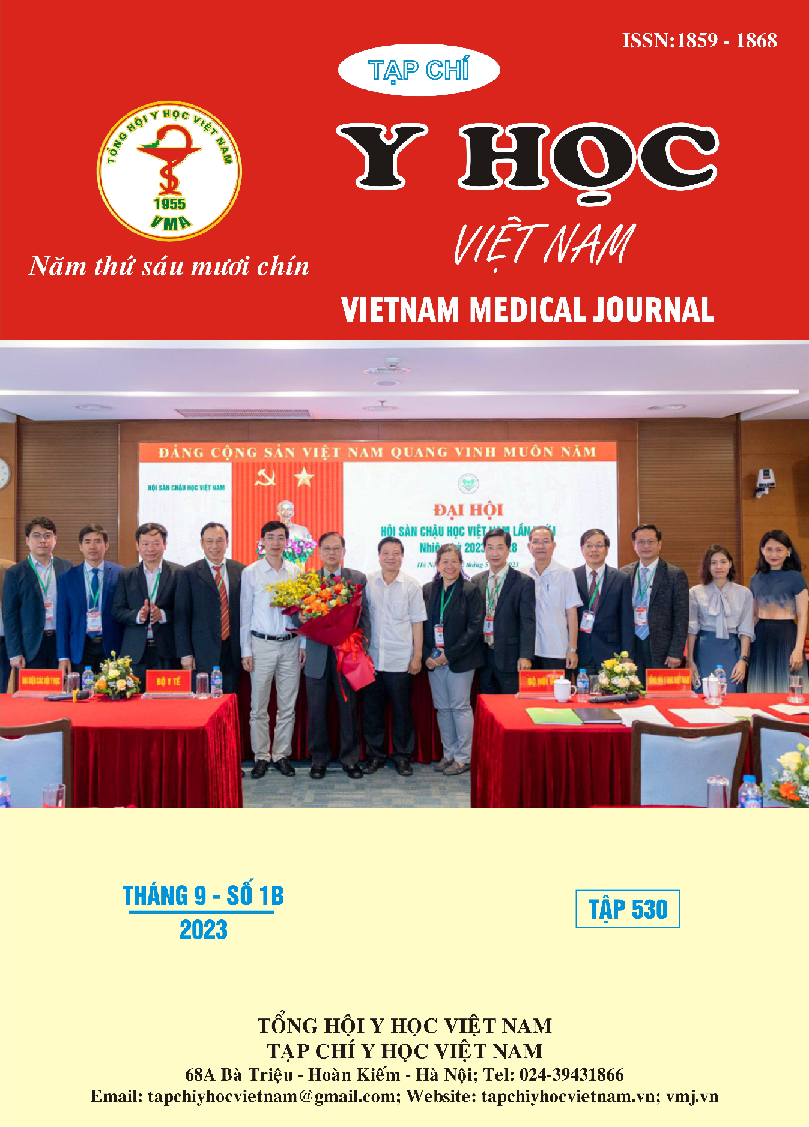RESULT OF ADJUVANT CHEMOTHERAPY WITH CAPECITABINE FOR STAGE II COLON CANCER
Main Article Content
Abstract
Aims: To identify the clinical characteristics, the laboratory characteristics, the result of adjuvant chemotherapy with capecitabine for stage II colon cancer. Patients and methods: Retrospective longitudinal follow-up descriptive study. Patients aged 18-75 years diagnosed with stage II colon cancer who underwent radical surgery from January 2017 to June 2019 at K hospital received adjuvant chemotherapy with capecitabine. Results: 69 patients were initially eligible for the study.The medium age was 62. Sex ratio: 1/1. The main presenting symptom was abdominal pain (74,5%), hemorrhagia (58%). Common locations of tumor were sigmoid colon (46,4%) and right colon (23,2%). Major histological grades were grade 2 and grade 1 (94,2%). Stage IIA, IIB, and IIC were 30,4%, 62,2% and 4,3%. 5-year overall survival (OS) and 5-year disease-free survival (DFS) were 91.2% and 89.1%, respectively. The high-risk and low-risk groups had different 5-year DFS (86,5% và 87,5%, p= 0,002). Conclusion: Patients with Stage II colon cancer generally have an excellent prognosis. Adjuvant therapy with Capecitabine has improved both OS and DFS in this stage. However, the benefits of adjuvant chemotherapy in Stage II disease remains unclear, “high-risk” factors for recurrence play an important role in adjuvant chemotherapy decision-making in Stage II colon cancer.
Article Details
Keywords
Stage II colon cancer, adjuvant chemotherapy, capecitabine.
References
2. Sargent D, Sobrero A, Grothey A, et al. Evidence for Cure by Adjuvant Therapy in Colon Cancer: Observations Based on Individual Patient Data From 20,898 Patients on 18 Randomized Trials. JCO. 2009;27(6):872-877.
3. Mai Liên (2010), Đánh giá kết quả điều trị hoá chất bổ trợ ung thư đại tràng giai đoạn dukes b tại bệnh viện K (2004 - 2009), Trường đại học Y Hà Nội, Hà Nội.
4. Nguyễn Quang Thái (2002), Nghiên cứu một số phương pháp chẩn đoán và kết quả sau 5 năm điều trị phẫu thuật ung thư đại tràng, Trường đại học Y Hà Nội, Hà Nội.
5. Vũ Thị Hằng (2015), Đánh giá kết quả điều trị ung thư đại tràng giai đoạn II, III bằng phẫu thuật kết hợp hóa chất bổ trợ FOLFOX 4 tại BV Đa khoa tỉnh Thanh Hóa, Trường đại học Y Hà Nội, Hà Nội.
6. Quasar Collaborative Group, Gray R, Barnwell J, et al. Adjuvant chemotherapy versus observation in patients with colorectal cancer: a randomised study. Lancet 2007; 370:2020.
7. Matsuda C, Ishiguro M, Teramukai S, et al. A randomised-controlled trial of 1-year adjuvant chemotherapy with oral tegafur-uracil versus surgery alone in stage II colon cancer: SACURA trial. Eur J Cancer 2018; 96:54.
8. Kumar A, Kennecke HF, Renouf DJ, et al. Adjuvant chemotherapy use and outcomes of patients with high-risk versus low-risk stage II colon cancer. Cancer 2015; 121:527.
9. Baxter NN, Kennedy EB, Bergsland E, et al. Adjuvant Therapy for Stage II Colon Cancer: ASCO Guideline Update. J Clin Oncol 2022; 40:892.


